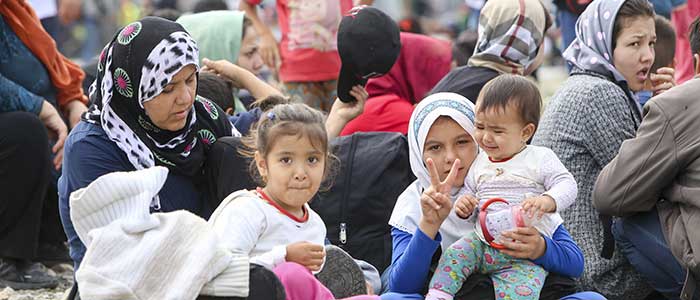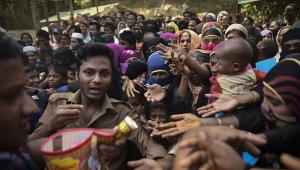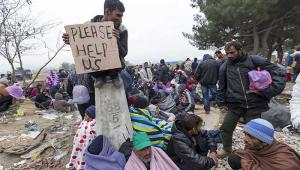Data from the think-tank’s Development Assistance Committee shows that 9.1% of total overseas aid – known as Official Development Assistance (ODA) – went towards donors’ refugee costs in 2015.
But OECD secretary general Angel Gurría said most countries have so far avoided diverting money from development programmes while still finding the large sums needed to cover the costs of Europe’s historic refugee crisis.
The OECD’s figures showed that, excluding the money spent on refugee costs, ODA spend was still up 1.7% in real terms.
The data also showed that aid from donor countries to the poorest has risen by 4% in real terms after donors committed to reverse a decline in rates.
In January, figures showed that over the course of 2015 the proportion of ODA sent to the least developed countries had fallen by 9.3%, while in April last year figures showed it had fallen by 16% in 2014 compared to the year before.
A survey of donor spending plans conducted by the OECD suggests flows to the poorest countries will keep rising.
Including refugee costs, development aid totalled $131.6bn in 2015, representing a 6.9% increase on the previous year.
Gurría said governments must continue to ensure development aid keeps rising, that aid reaches the countries and people that need it most, and that they develop long-term options for meeting future refugee costs.
The OECD’s rules allow countries to count refugee-related expenses as ODA for only the first year after their arrival.
Three countries – Australia, Korea and Luxembourg – do not count refugee costs as ODA. Others, including Austria, Greece, Italy, the Netherlands and Sweden, saw refugee costs account for more than 20% of their ODA in 2015.
The ONE Campaign highlighted that with more than five countries now spending 20% of their aid budgets at home, and countries like Germany and the Netherlands now the single biggest recipients of their own aid, it was clear refugee costs were taking precedence.
“It’s promising to see aid to the poorest finally starting to increase,” said Adrian Lovett, interim deputy CEO of ONE, noting that the news is a big boost for campaigners who have insisted the costs of the refugee crisis should not be met at the expense of the least developed countries.
“But extreme poverty must be tackled with the same sense of urgency that Europeans have shown in supporting refugees,” he continued. “It would be short-sighted for governments to neglect funding for long-term development needs for some of the most vulnerable in the world in order to fund costs at home. We can and must do both.”
Some of the countries that saw the biggest increases in refugee costs, including Greece and Germany, also saw the biggest increases in ODA.
Six countries reported a lower ODA spend than in 2014, with the steepest declines in Australia and Portugal, which the OECD recently urged to boost its dwindling aid budget.
Only six countries – Denmark, Luxembourg, Norway, Sweden and the UK – met their commitment, made decades ago at the United Nations, to keep ODA at or above 0.7% of gross national income.
While the US was the biggest spender with $31bn worth of ODA last year, it was far from this target at just 0.17% of GNI.
Publish What you Fund also released their annual Aid Transparency Index today to coincide with the OECD's aid figures. The index showed that the majority of the world's major donors do not meet standards on transparency and openess.














